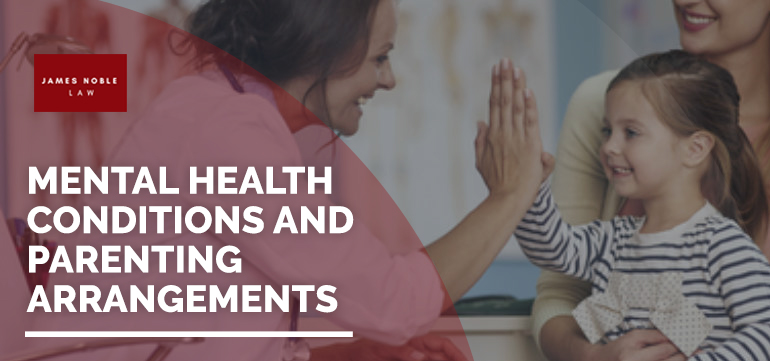
How Do Mental Health Conditions Affect Family Law Proceedings?
 If you have been diagnosed with a mental health condition, this can impact both child welfare/parenting arrangements addition to property disputes. However, a mental health condition does affect or have relevance to divorce proceedings (family law proceedings) (provided there are no children in the relationship).
If you have been diagnosed with a mental health condition, this can impact both child welfare/parenting arrangements addition to property disputes. However, a mental health condition does affect or have relevance to divorce proceedings (family law proceedings) (provided there are no children in the relationship).
Mental Health in Parenting Disputes
The first and foremost principle applied by the Court in any parenting proceeding is placing the welfare of the child as the ‘paramount’ consideration’. Whilst this does not mean the Court disregards other considerations, the best interests of the child will always take precedence when it comes to mental health in parenting disputes.
Importantly, where one or more party to the family law proceedings has been diagnosed with a mental health condition, there is no legal presumption that the person is not capable of being a responsible parent.
However, as the best interests of the child remains the Court’s paramount consideration, the Court has the power to decide whether the parenting capacity of a person who has been diagnosed with a mental health condition is limited or reduced. In outcomes such as these, the Court may alter or change a parenting arrangement.
When do Mental Health Conditions Become Relevant to Parenting?
The common situations where mental health conditions become relevant to parenting disputes involve:
- Where a party has been previously diagnosed with a condition or illness;
- Where evidence suggests a party may soon be diagnosed with a condition;
- Where a party has recently become temporarily unable to care for the children due to a condition or illness;
- Where a party is the subject of a voluntary treatment order, or, is voluntarily receiving ongoing treatment for a condition or illness
- Where a medical official believes the nature of a party’s condition/illness or the side effect of any drugs may affect the capacity to provide appropriate care; and
- Where a party has previously received treatment for a condition/illness but has stopped or prevented further treatment due to unknown circumstances.
In any of the circumstances mentioned above, the party who has concerns regarding the other’s parenting capacity can seek to change an existing informal arrangement or apply to have existing parenting orders altered by the Court.
 Effect and Outcome of Court Proceedings
Effect and Outcome of Court Proceedings
If a party to the proceedings claims that the other has a reduced parenting capacity as the result of a mental health condition/illness, they may present expert evidence (this is commonly from a doctor, psychiatrist or psychologist) that supports their submissions.
However, the other party against which these claims are made may also present expert evidence. It is not uncommon for the Court to appoint an independent expert which can review all evidence and parties and prepare a report with recommendations to the Court.
If the Court believes a party who has been diagnosed with a mental health condition/illness has a reduced capacity, an order may be made which results in that party losing the right to provide daily or shared care of a child or children or the right to regular contact with the child (may instead be limited to supervised contact).
Need Legal Help?
If you need help, please contact the Brisbane Family lawyers team at James Noble Law today for a FREE, no-obligation 20-minute consultation. To schedule an appointment with one of our Qualified and experienced Family lawyers Brisbane.
Find Brisbane family lawyers on Google Maps near you.
You may also like to know more information about the
- Learn about the Family court portal.
- Family Law act 1975.
- Parental Responsibilities and Legislation.
- Mother withholding child from father Australia.
- Top Tips To Protect Yourself After Separation.
- Separated and Living Under One Roof?
- A Guide to Separation in Family Law Download.
- Learn about Brisbane court house.
- Spousal maintenance qld, Brisbane, Australia.c
- Online Divorce application In Australia.
- Divorce property settlement examples Australia.
- Get Divorce application forms.


 Effect and Outcome of Court Proceedings
Effect and Outcome of Court Proceedings